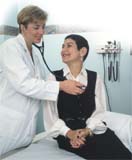Breastfeeding
on a Medication not Studied Before
Mother
and Baby (6 months) came to me for information regarding the safety of breastfeeding while on medication for Grave’s
disease (hyperthyroid). Several medications for thyroid are approved for breastfeeding mothers by the American
Academy of Pediatrics. The medications considered “safe”
caused a life threatening, drop in the mother’s white blood cell count, but was reversible upon discontinuation. However,
now her thyroid was functioning incorrectly. The side effects of the medicine limited her options to a medication which I
had very little data about safety—a concentrated solution of iodine. In fact I had contradictory advice within the international
lactation community actually discouraging the use of this medication which her surgeon eventually prescribed.
Being
that the baby was no longer an infant and the short term use of the medication, the mother decided to continue breastfeeding
as long as we checked the drug breast milk levels and the baby’s thyroid levels once a week. The mother was on the medication
for three weeks. The baby’s blood test remained normal. The iodine does get into the breast milk. The thought of this bothers a lot of specialists. However iodine is also in formula! And her milk iodine
level while on the medication was comparable to the amount in formula; Even less than some brands! After three weeks of treatment,
the mother’s thyroid and blood count were stable and she had her thyroid removed. She is recovering well.
Thyroid
surgery, as is most surgery, is compatible with breastfeeding but, the anesthesiologist still sternly warned the mother not
to breastfeed for 24 hours following surgery. More intimidation and inaccurate information for this mom to deal with! Mothers
can breastfeed post c-section and following most surgery as soon as the mother is awake. This is well documented. It was very
important for this mom to continue breastfeeding as a way to help her heal from a repeat emergency cesarean section.
Thanks to James J. Vopal, D.D.S., M.D., a Dual Board Certified Surgeon at The Breast Care Center
of the Treasure Coast, willing to collaborate on her care and share his expertise and thanks to Martin Memorial labs who tested
the milk levels weekly without a flinch to help complete this care. An international lactation journal has shown interest
in publishing the lab data and the details. Future dyads in the same situation may have more options available to them.
The
surgeon and mother are also commended for following through with the surgery while the hospital had been ordered to evacuate
for a hurricane. WHEW!!!!
This
thriving baby has been exclusively breastfed through all of this!

